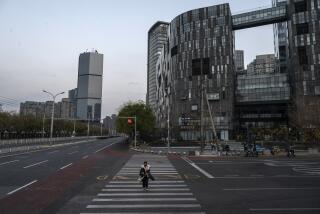For China’s New Rich, What Glitters Is Platinum : Wealth: Jewelry made of the metal appeals to city dwellers, who think it is classier than gold.
- Share via
BEIJING — What do you buy when you already have French suits, Italian leather shoes, a gold watch and your own car?
For China’s growing upper class, it’s platinum jewelry.
That was the message at Da Ming, a glitzy new jewelry shop on Wangfujing, Beijing’s main shopping street, when it opened on Christmas Day with a front-counter display of platinum rings encased by diamonds--at a cost of up to $1,150.
“Platinum appeals to a higher class of people, better educated, and the new rich who already have gold jewelry and want more,” said Chen Qiang, the shop’s manager.
He said sales so far have been for less expensive platinum items--up to $230, still almost the average annual income for an urban resident of China in 1993.
The story is the same at the other jewelry stores on Wangfujing that have sprung up in part to cater to people concerned that their money will lose value amid China’s high urban inflation.
“We started selling platinum jewelry several months ago,” a saleswoman at one shop said.
“It appeals to young, rich city men who think it is classier than gold. They like the fact that many people do not know how valuable it is, which appeals to their sense of exclusiveness. And designs are improving.
“Only city people buy platinum. Rural people all buy gold. And if you are giving a present, it is safer to give gold jewelry,” she said.
Gold jewelry sells in most shops for about $121 an ounce, compared to $560 for platinum.
On the New York Mercantile Exchange, platinum was trading at about $388 an ounce. Its price fluctuates, like that of gold, because of factors such as international turmoil and political unrest.
The auto industry is a major user of platinum for catalytic converters.
The Chinese, suspicious of paper money, have for centuries bought gold as an investment. But platinum has gained popularity as some Chinese become rich enough to look beyond gold.
In Chinese, platinum is “white gold,” an auspicious name.
A spokesman for the China Jewelry Import & Export Corp. said the market for platinum jewelry remains limited, although he gave no figures. China does not publish figures on platinum production or sales.
At Da Ming, Chen said, “gold jewelry still sells better than platinum.”
But platinum sales have been fueled by the growth in the number of what ordinary Chinese call da kuan (fat cats), who think nothing of spending several hundred yuan--a month’s income for a Beijing resident--on a single lunch at a high-class restaurant.
“I like it because it is worth more than gold and because it is still exclusive,” said a businessman in his 30s who was buying a platinum ring. “Many people do not know how valuable it is.”
An official survey published in November found that the richest 3% of the population in China had more money in the bank ($33.7 billion) than all of the nation’s 900 million farmers, who have deposits of only $31.5 billion.
According to official figures, the average urban citizen last year earned about $264; his cousin in the countryside earned $97.
Most of the urban fat cats are entrepreneurs or work for companies with good official connections.
Increasingly uncomfortable with this disparity, the Communist Party has said that its final objective is prosperity for all. But in the short term, it says, it is acceptable for a small number of people to become rich first, like pioneers blazing a trail to the promised land.
*
But platinum jewelry did not impress one cynical Beijing taxi driver who admitted to earning $230 for a seven-day week.
“That is only for people who have too much money and do not know what to do with it,” he said.
“Why buy an imported French suit when you can buy a good Chinese one for a tenth of the price? They buy it just to show off,” he said. “And we have people in China who do not have enough to eat or wear.”


